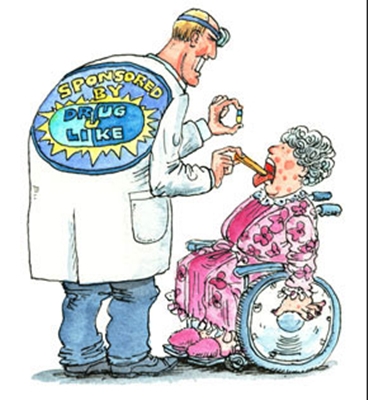(单词翻译:单击)

TWO drug executives walked into a bar. No, this is not the start of a joke. The workers for Roche, a Swiss drugs firm, had been dining with doctors after a medical conference. At the bar, alleged an anonymous complaint in a recent report by a British industry watchdog, they bought the doctors drinks (“shots of varying colours flowed like hot lava”). One executive danced on stage, prompting bar staff to throw him out. Roche maintains its managers ran into the doctors and did not buy them drinks. But the evening hardly seems like the finest moment in the history of ties between doctors and drug companies.
两名制药公司的高管走进一家酒吧。别理解错了,这可不是在讲笑话。瑞士制药企业罗氏公司(Roche)的员工开完医学会议后,此时正和医生们共进晚餐。在一家英国行业监督机构最近发表的报告中,一位匿名人士指控这两名员工在酒吧请医生喝酒(“照片上的酒颜色各异,像喷涌而出的火热岩浆”)。一名高管登台起舞,结果被酒吧服务人员赶了出去。瑞士公司则坚持认为,其负责人是偶然碰到几位医生的,而且也没有请他们喝酒。但这个夜晚怎么看也不像是医生与制药企业的关系史上最美好的时刻。
That relationship is a poorly regulated muddle. At one (beneficial) extreme, firms work with doctors to create new treatments. At the other end of the spectrum, firms bribe doctors to prescribe their drugs. America’s justice department has wrung huge settlements from companies over such charges. Between these poles is a lot of activity deemed standard by some, repugnant by others—and which is increasingly subject to new laws.
二者关系疏于监管,可谓一团糟。一个(有益的)极端是,企业为创造新的治疗方案与医生合作。另一个极端则是企业向医生行贿,以便让医生在开药时选择他们厂家的产品。美国司法部门从此类官司涉及的公司中榨取了大量罚金。两个极端之间可以有种种行事,有些人视之为标准,有些人则嗤之以鼻,而新法律对这些管得越来越严了。
This month American regulators released rules to implement a so-called Sunshine law designed to improve transparency. France passed a similar law in 2011. Firms in Britain are planning voluntary disclosures. By 2015 more than 70% of drug sales will be in countries with such measures, according to Deloitte, a consultancy.
本月,美国监管机构公布了新规定,旨在贯彻实施一部所谓的“阳光法案”,以提高企业透明度。法国在2011年通过了一部类似的法案。英国的企业正计划着主动公示信息。据咨询公司德勤(Deloitte)显示,在2015年前,70%以上的药品会在采取此类措施的国家中销售。
America’s health-care market, the world’s biggest, is particularly busy. In 2012 pharmaceutical companies spent more than $24 billion marketing drugs to doctors, according to Cegedim Strategic Data, a research firm; 35% of doctors accept food, entertainment or travel from the pharmaceutical industry, said a survey by Deloitte last year, while 16% accept consulting or speaking fees. In most states, doctors take regular courses to maintain their licences. In 2011 drug and device companies sponsored nearly a third of the medical training tracked by the Accreditation Council for Continuing Medical Education.
美国拥有世界上最大的医疗市场。如今,该市场相当热闹。据调查公司Cegedim Strategic Data 称,2012年制药企业为了向医生推销药品,所花费用超过240亿美元;根据德勤去年做的一份调查显示,35%的医生接受了制药行业的宴请或其提供的免费旅游,而16%的医生收受了咨询费,或者说演讲费。大部分州的医生为维持医师资格证,需要定期接受培训。2011年美国继续医学教育认证委员会(Accreditation Council for Continuing Medical Education)发现,其追踪调查的医学培训机构中有近1/3是由医药和器械公司赞助。
Such chumminess has long raised fears about undue influence. In 2008 two health-industry groups set tighter, voluntary standards for companies. In 2009 America’s Institute of Medicine, an advisory body, urged much stricter regulation to prevent conflicts of interest.
一直以来,人们都担心医商之间的这种亲密无间会带来不好的影响。2008年,两家医疗健康产业集团为企业制定了更严格的自愿性质标准。2009年,美国顾问团医院研究所(America’s Institute of Medicine)敦促要加强监管力度,防止利益纠纷。
Legislative action, though, has been slow, especially at the federal level. The Sunshine law, passed as part of Barack Obama’s health reform, is the first national requirement for transparency. Each year drug and device firms must disclose payments and other “transfers of value” to doctors. They must also report research fees and doctors’ investment interests. The first filing will appear on a public database by September 30th, 2014.
不过美国在立法方面行动一直很慢,尤其是联邦层级的立法。“阳光法案”是作为巴拉克??奥巴马医疗改革项目的一部分通过的,它是第一部为提高透明度的国家级法案。每年,医药和器械公司必须公开支付信息,以及其他用在医生身上的开销。他们也必须汇报研究经费、医生在医疗公司投资股权。第一批申报文案将于2014年9月30日前上传至公共数据库中。
The rule’s broader effects are uncertain. It does not limit firms’ interactions with doctors; it merely requires them to be reported. Certain marketing techniques, such as providing free drug samples, are exempt. And in some ways the law is already out of date. It regulates only doctors and some hospitals, not nurses, pharmacists or hospital bureaucrats who have a growing role in patients’ treatment.
这项规定会产生怎样更大范围的影响还不得而知。它并没有限制企业与医生之间的往来;仅仅只是要求他们上报相关信息。某些营销方案不在监管之列,比如为医生提供免费的药物样品。法律在某些方面已经过时了,它所监管的只有医生和某些医院,却不包括护士、药剂师或者医院的行政人员,而这些人在病人的治疗中发挥的作用越来越大。
Nevertheless, the Sunshine law is likely to lead to at least one change. Firms already have data on each doctor’s prescriptions, points out Chris Wright of ZS Associates, a consultancy. The Sunshine law will also provide them with exhaustive data on how much they and their competitors spend to market drugs to that doctor. This will let firms track which type of marketing spurs the most prescriptions. Companies will not stop wooing doctors. They may simply get better at it.
尽管如此,阳光法案至少可能带来一个转变。咨询公司Chris Wright of ZS Associates指出,制药企业已经掌握了每个医生的处方内容。阳光法案还将为这些企业提供详细数据,让他们了解自己和竞争对手在向医生推销药品时的花销情况。这将有利于企业追踪调查,找出最利于销售的推销方案。将来,企业还是会向医生献殷勤。但或许他们只是更擅长罢了。


